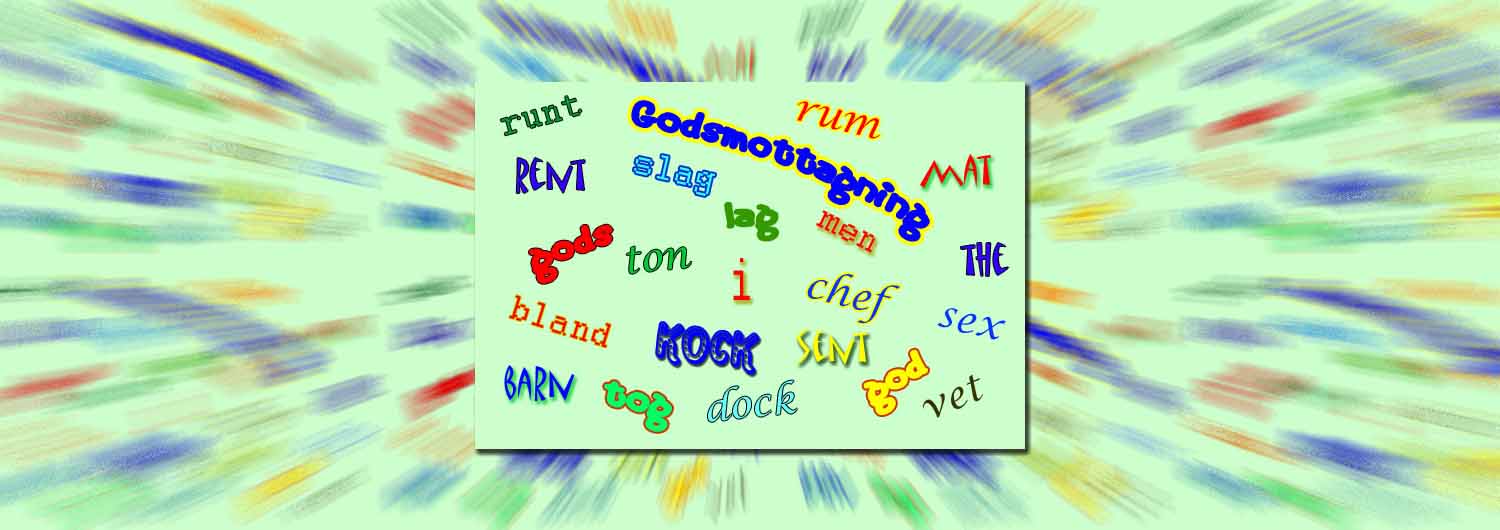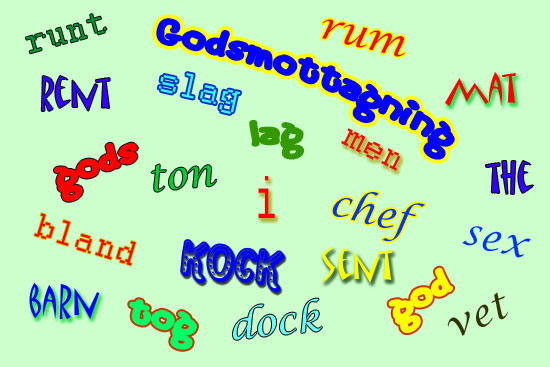The daily word game I play on Twitter, Artwiculate, messed up today – or mussed up if you prefer. Muss was the word they gave us to play with. In British English, muss is a rarely used verb with an old fashioned, American quality about it. It is a variant of the word mess and means to make untidy, crumple, ruffle, smear, mess, entangle, confuse.
Unfortunately for our game, it is also the German word for must.
Unfortunately, because the software that underpins Artwiculate picks up any uses of the Word of the Day on Twitter and assumes they were composed for the game. So today we were swamped with imperative German tweets.
It got me wondering if there were other words that might cause a similar flood of Swedish tweets.
Words of Confusion
A little research produced a small selection of possibilities. One of the most common words in Swedish is i meaning in, but the chances of Artwiculate giving us an English pronoun to play with are invisible.

The English word men is a remotely possible choice. That would attract a considerable number of Swedish tweets as it is the Swedish word for but.
However, the game usually goes for less common English words. Words like bland, runt, slag, tog and lag. These are all among the 1000 most frequently used Swedish words, though they mean something different than in English.
Bland, runt, tog and slag
In English, food is bland when it has little flavour. (English food generally, some would say.) But in Swedish bland translates among and is one of the 100 most common words in the written language.
In English a runt is the smallest, weakest animal in any litter, and thus also a word to use to describe a person you think small or weak physically or mentally. Whilst the Swedish word runt translates round.
In English, slag is the waste product of a foundry, a mine or a volcano. Also, in British slang, a coarse word for a woman and to slander someone (slag someone off). Meanwhile, in Australian English (according to my dictionary) it also means to spit. In Swedish slag translates punch or and also means a fight, a battle, a sort, a type and the stroke of a clock’s bell – among other things.
Tog is an informal English word meaning to dress oneself in smart clothes. It is also the name of a unit of thermal resistance used to measure the power of insulation of a fabric, garment or quilt etc. But in Swedish tog is the simple past tense form of the verb ta meaning take.
In English, lag has to do with slowing down or falling behind. It is also a slang word for a convict or former convict and a word to describe the layer of insulation used to protect pipes. In Swedish it means team.
A very religious nation
There are a number of other words where a deal of confusion is possible. God means good in Swedish and gods means goods. Hence the old joke about the tourist who decided the Swedes must be a very religious nation because every railway station and bus station he saw had its own Godsmottagning (Goods reception).
Swedish the is English tea, rent is clean, barn is child and sent is late. Mat is food, ton is tone, dock means something like on the other hand and vet is the imperative form of the verb veta meaning to know.
In Sweden rum is both an alcoholic drink and the common word for room, just as sex means both six and sex. And every company has its chef – who may also be a cook in his or her private life but in the company is actually the boss. (What the English call a chef, the Swedes call a kock – which might lead to other confusion).
I could go on, but think I’d better stop now and do something more constructive.
Toodloo!
Note that the my source for the 1000 most used Swedish words (in newspaper texts – which newspapers and from when unspecified) is here: http://rl.se/tusen.html



John,
That was both funny and educational!
Word of caution, I thought it was one of your artwiculate round-ups when I saw the first picture, fortunately I kept scrolling down, realised it was something else and scrolled up again.
Thanks K.
Have taken your comment on board and reversed the order of the pictures.